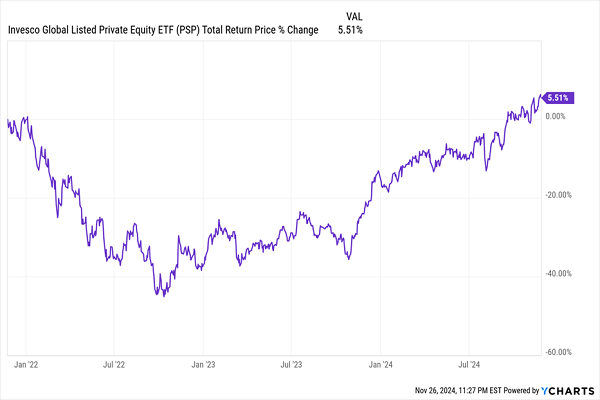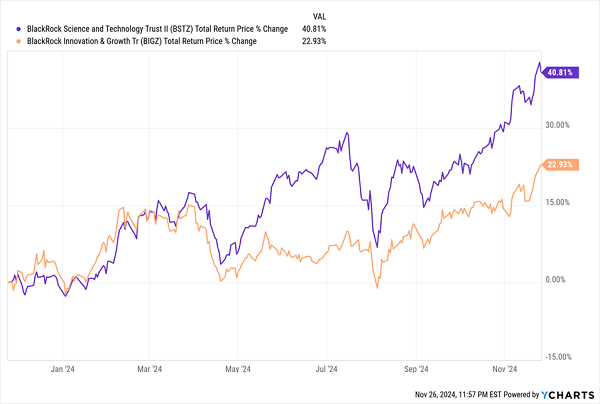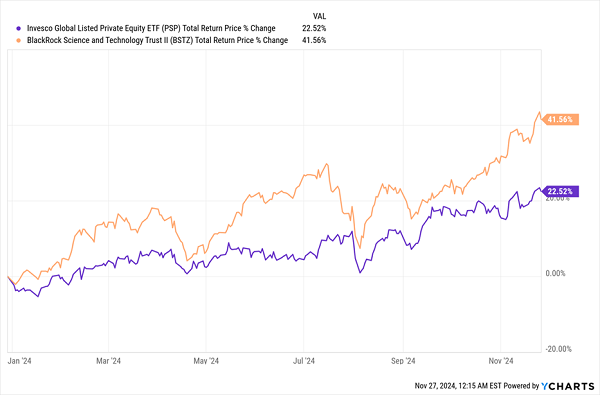If you’ve been investing for a while, you’ve probably thought about private equity more than once. Adding exposure to “PE” firms, which buy and sell privately held businesses, is a great way to diversify beyond the big names of the S&P 500.
But of course, to get in on that action, we have to be either institutional investors or have a net worth high enough to be “accredited.”
Most people stop there. But there is a way to access private equity through a kind of lesser-known “back door.”
For example, you could buy an ETF like the Invesco Global Listed Private Equity ETF (NYSE:PSP) right on the stock market. The fund holds publicly traded PE firms like Blackstone (NYSE:BX), KKR & Co (NYSE:KKR) and the Carlyle Group (NASDAQ:CG).
It’s also had a pretty decent run, with a 9.1% annualized return over the last decade. More recently, though, PSP’s returns have been a bit weaker, reflecting a PE market recovering from its overvaluation in 2021.
PSP Is in Rebound Mode

However, private equity is recovering in 2024, with a year-to-date return above 25% both for PSP and the index on which it’s based: the S&P Global Listed Private Equity Index. That makes now an interesting time to invest in the PE space.
But we can do better than PSP and its 2.9% yield (an annualized calculation based on the fund’s latest quarterly distribution) with the double-digit yielders I’ll show you in a bit.
Doing so means we can use the higher cash flow to pay our bills and become more financially independent, of course. But a large income stream has a different function when it comes to private equity.
Since this market can be highly volatile, a high dividend ensures we’re getting more of our return in cash, and at regular intervals. We can then either use these funds to diversify away from private equity or buy more at a bargain when the market turns against these assets.
This is better than what most people do: Sell a bigger portion of their low-yielding “regular” stocks to generate cash. Trouble is, it’s easy to give in to emotion and do this more during bear markets, when it’s the worst time to do so financially.
2 High-Yielding Private-Equity CEFs to Consider (1 Is a Top Buy)
With that in mind, there are two closed-end funds (CEFs) with big parts of their portfolios in private equity that are compelling here: the BlackRock (NYSE:BLK) Innovation and Growth Term Trust (NYSE:BIGZ), which yields 13% as I write this, and the BlackRock Science and Technology Term Trust (NYSE:BSTZ) (BSTZ), with a 12.1% yield.
BIGZ has about a quarter of its assets in private equity, and BSTZ is closer to a third. Both funds mainly focus the rest of their holdings on tech companies, like NVIDIA (NASDAQ:NVDA) and chipmaker Monolithic Power Systems (NASDAQ:MPWR), that are themselves exposed to private firms through their vendors and customers.
This diversification has helped both funds recover strongly since the 2022 selloff, with the last year showing particularly strong returns for BSTZ (in purple below). That’s partly because it devotes more of its portfolio to private equity.
BSTZ and BIGZ Post Strong Returns

In total, BIGZ’s private equity investments have seen a 44.1% decrease in their value on average, since the fund’s inception in 2021 (you can see a breakdown of the performance of BIGZ’s PE holdings and those of BSTZ here, on pages 9 and 14, respectively).
This also explains why BIGZ trades at a 10.2% discount to net asset value (NAV, or the value of its portfolio) today. Management is just not doing the best job on the PE side.
BSTZ, meantime, has had a positive 30.9% return on its PE investments, but that’s going back to late 2019, since the fund is older. This is clearly much better, which explains why BSTZ’s discount to NAV is much smaller than that of BIGZ, at 7.3%.
Plus, BSTZ’s 12.1% dividend gives you more control over your investment than you’d have if you just bought PSP, the private-equity ETF we mentioned earlier. Plus—and this is the real key here—BSTZ’s performance is getting better over time as the PE market recovers, which may be why the CEF (in orange below) has been outrunning PSP lately:
BSTZ Soars Past the Private-Equity ETF

That makes BSTZ the best buy here—not just for the PE exposure and the 12.1% income stream, but also because we can still get in at a decent discount as private equity continues to recover.
5 Big Monthly Dividends (Average Yield: 10.5%) to Buy Now
Private equity is just one asset we can tap through CEFs. There are MANY more: stocks, bonds, real estate—you name it.
And as is the case with BSTZ and BIGZ, we can get into these assets while getting a huge income stream, since CEFs yield around 8% on average today. What’s more, most CEFs—like the five 10.5% yielders I’m urging my readers to buy now—pay dividends monthly!
That saves us having to manage “lumpy” quarterly payouts, sure. But it also let us reinvest our dividends faster. Which is critical, particularly in a pullback, because it gives us cash we can use to pick up oversold bargains.
Disclosure: Brett Owens and Michael Foster are contrarian income investors who look for undervalued stocks/funds across the U.S. markets. Click here to learn how to profit from their strategies in the latest report, "7 Great Dividend Growth Stocks for a Secure Retirement."
